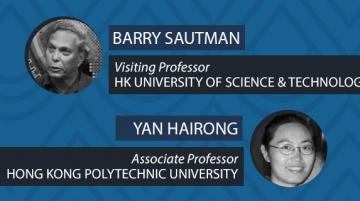
The presence of Chinese workers who are helping to build the billions of dollars of infrastructure across Africa is one of the most contentious points in the China-Africa relationship. These workers are often seen as unwelcome guests doing jobs that could or should be done by locals.
There is a myriad of reasons why they’ve been brought to places like Kenya, Ethiopia and dozens of other countries across the continent. Sometimes they bring a skill that’s hard to find locally other times it comes down to cost and convenience. Chinese project managers often face crushing deadlines to complete their builds and it’s faster, easier and even cheaper to deal with a compatriot than someone who doesn’t speak their language or share a common background.
Although research organizations like the China-Africa Research Initiative at Johns Hopkins University compile rough estimates of the number of Chinese workers in Africa, it’s very difficult to accurately quantify a precise number. Regardless of the number, though, the impact these workers are having in Africa is undeniable.

But too often in the discussion about Chinese workers, the focus tends to be entirely on the African side of the equation and how these migrant workers are taking opportunities away from locals. While there’s no doubt, in some cases, that’s true, the problem with that discussion, though, is that it dehumanizes the Chinese. They essentially become this inanimate presence rather than understand who these Chinese workers are and how do they feel about being in countries that are strange to them and both physically and culturally far from home.
To survive in Ethiopia meant to swallow disappointment. [Chinese worker] Yu Bohai’s initial expectations of life and work there stood in sharp relief to the less rosy realities on the ground, leaving him disenchanted. He could not get his head around why Ethiopians were so unwelcoming, or, as he put it, “unfriendly.”
Miriam Driessen from her new book “Tales of Hope, Tastes of Bitterness Chinese Road Builders in Ethiopia”
Oxford University postdoctoral researcher Miriam Driessen set out to do just that in her compelling new book “Tales of Hope, Tastes of Bitterness Chinese Road Builders in Ethiopia.” And what she found in her research may come as a surprise to many who have never spent much time to think about who these workers are and how they feel about what they’re doing in a country like Ethiopia.
Many came to Ethiopia with bursting with idealism about the idea of helping an underdeveloped country modernize. But that optimism often turned to disillusionment, bitterness and a feeling of disenchantment.
Book Notes:
- Download a PDF sample from Hong Kong University Press
- Purchase a copy on Amazon.com (hardcover only)
Show Notes:
- Economist: Chinese workers and traders in Africa
- The New York Times: Kenyans Say Chinese Investment Brings Racism and Discrimination by Joseph Goldstein
- Fahamu: Pushback Against Chinese Workers Escalates in Africa

Dr. Miriam Driessen is trained as an anthropologist. She earned her doctorate from the School of Anthropology and Museum Ethnography, University of Oxford (2015). Prior to joining the China, Law, and Development (CLD) project, she was a visiting fellow at Peking University and a Leverhulme Early Career Fellow at the Oxford School of Global and Area Studies and Jesus College.
Miriam’s research looks at the consequences of China’s new globalism in Africa, and Ethiopia in particular. Her book Tales of Hope, Tastes of Bitterness: Chinese Road Builders in Ethiopia examines Chinese-led development in Ethiopia from below, revealing its social, legal, and racial tensions. Following the everyday lives of Chinese and Ethiopian workers on and off the construction site, it shows how structures of domination and subordination are reshaped on the ground. The experiences of Chinese workers in Africa are closely linked to a Chinese society in flux. In a number of articles, published in The China Quarterly, the Journal of Ethnic and Migration Studies, and Public Culture, Miriam looks at the intersection of migration and social change in mainland China. Her essay The Restless Earth was the runner-up of the 2018 Bodley Head/Financial Times Essay Prize.






